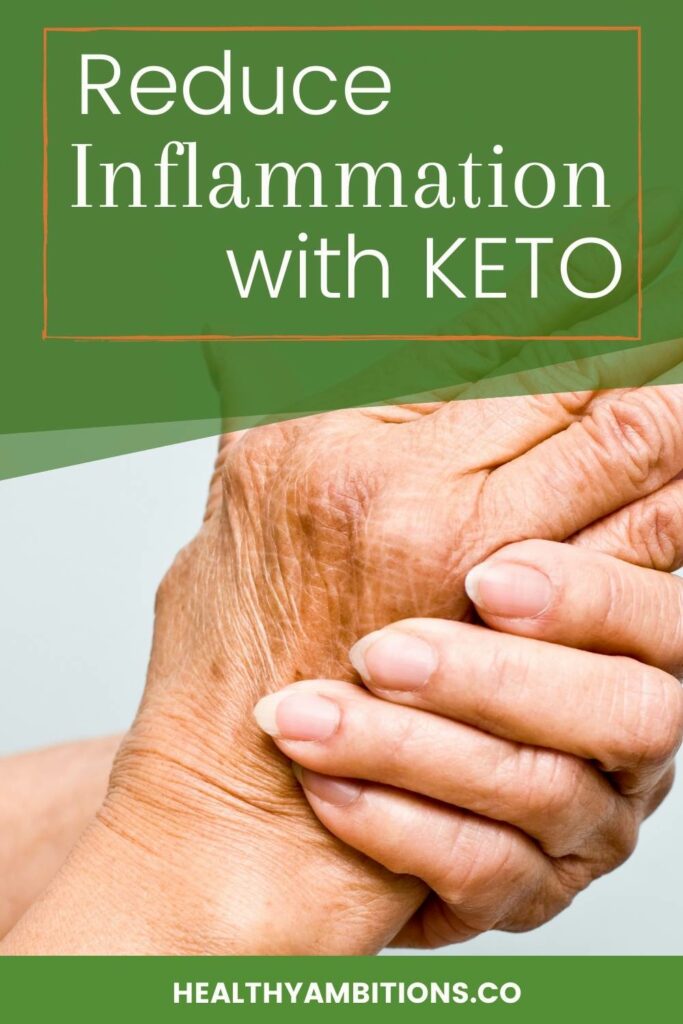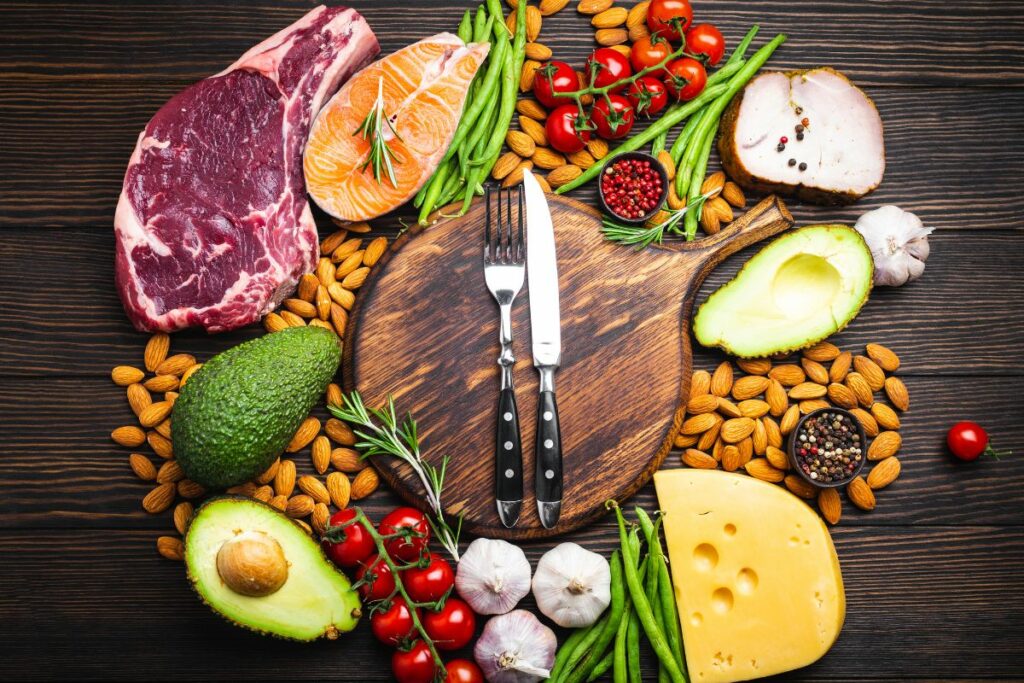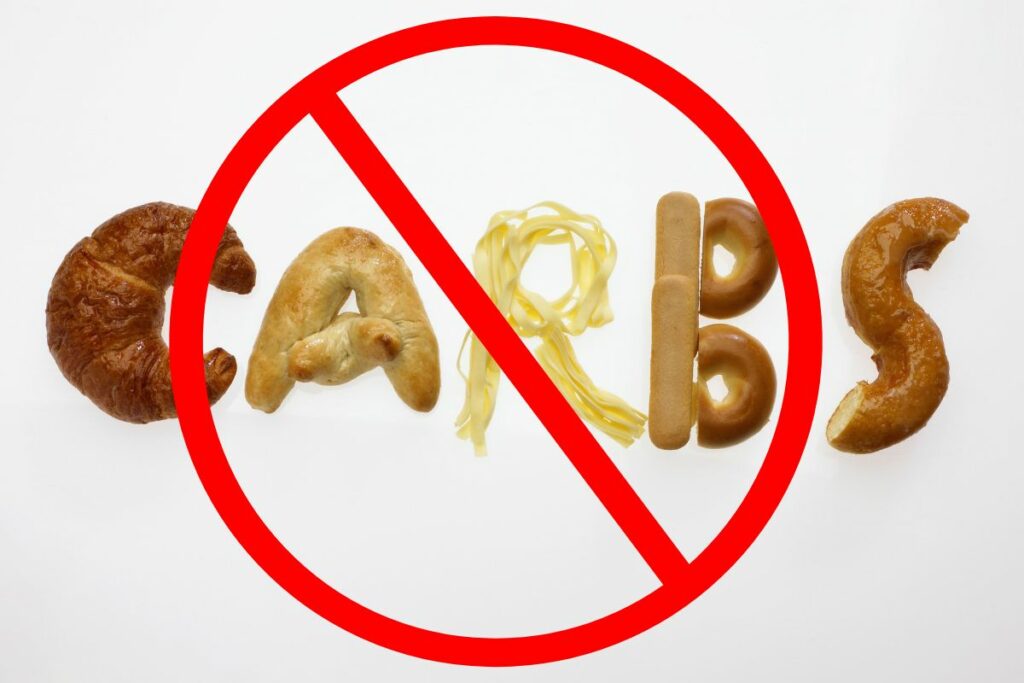How Keto Can Reduce Inflammation
The ketogenic (keto) diet is often synonymous with weight loss. Many people turn to this high-fat, low-carb eating plan to shed extra pounds, feasting on creamy avocados, sizzling steaks, and rich cheeses.
But the benefits of the keto diet extend beyond the scale. While weight loss may grab the headlines, there’s another compelling aspect to this lifestyle that often goes unnoticed: keto can reduce inflammation
Yes, the same diet that can trim your waistline might also be a secret weapon against that stubborn inflammation in your body.

This post may contain affiliate links, which helps keep this content free. Please read our disclosure for more info.
Understanding Inflammation
Inflammation is your body’s natural response to anything it sees as foreign or threatening. Think of it as your body’s personal security system, springing into action when faced with an injury, infection, or chronic illness.
When you get a cut or catch a cold, inflammation is the body’s way of saying, “I’ve got this!”
But wait, it’s not all high-fives and victory dances. Sometimes, inflammation can be a party crasher.
If it hangs around too long or shows up when it’s not needed, it can cause problems. Ever felt swollen, red, or achy? That’s inflammation overstaying its welcome.

In chronic conditions, where this unwanted guest refuses to leave, inflammation can lead to more serious health issues, like heart disease or arthritis.
And it’s not just about physical discomfort; inflammation can affect your sleep, mood, and overall quality of life.
So while inflammation is often your body’s way of protecting you, it can sometimes turn against you, becoming more of a foe than a friend.
How can you manage or even reduce this complex response? Could the keto diet be the key?
The Keto Diet – A Quick Overview

The ketogenic, or keto diet is a high-fat, low-carbohydrate eating plan designed to change the way your body sources its energy.
Instead of relying on carbohydrates, the body shifts to burning fats, transforming them into molecules called ketones in the liver. This metabolic state is known as ketosis.
What’s on the menu?
- Fats: Healthy fats take the spotlight in the keto diet, making up about 70-75% of daily calories. Think avocados, olive oil, nuts, and fatty fish.
- Proteins: Moderate protein intake is also key, with sources like eggs, meat, and seafood providing about 20-25% of daily calories.
- Carbohydrates: Carbs are limited to roughly 5% of daily intake, so bread, pasta, and sugary snacks are off the table.
The primary goal of the keto diet is to encourage the body to burn fat for fuel, and this unique approach has made it a popular choice for weight loss.
But the potential benefits extend beyond the scale, and the relationship between the keto diet and inflammation is an exciting area of study.
Keto Diet and Inflammation – The Connection
The connection between the keto diet and inflammation isn’t merely a matter of what’s added to your plate, but what’s taken away.
By focusing on the foods included in the keto diet and avoiding those known to cause inflammation, the diet may have substantial anti-inflammatory effects.
Reducing Inflammatory Foods

The keto diet’s limited carbohydrate intake means cutting out foods like grains, sugar, and high-carb vegetables, many of which can contribute to inflammation.
Eliminating these culprits can lead to a decrease in inflammatory markers:
- Grains: Many grains contain gluten and other compounds that can cause inflammation in some individuals.
- Sugars and Processed Foods: High sugar intake has been linked to increased inflammation, and cutting back on sugary foods can reduce these inflammatory responses.
- High-Carb Vegetables: Some starchy vegetables may cause blood sugar spikes leading to inflammation, and the keto diet typically excludes them.
Ketones and Their Anti-Inflammatory Effects
In addition to the benefits of reducing inflammatory foods, the production of ketones like beta-hydroxybutyrate (BHB) may also play a role in dampening inflammation.
Research shows that BHB can inhibit certain inflammatory pathways, adding another layer to the anti-inflammatory potential of the keto diet.
Related Article: How to Test Your Ketone Levels for Ketosis (3 Different Methods)
Impact on Inflammatory Diseases
The combination of cutting inflammatory foods and the anti-inflammatory properties of ketones may provide relief for chronic inflammatory conditions.
Some studies suggest potential benefits for conditions like rheumatoid arthritis and inflammatory bowel disease.
Benefits of Keto in Managing Inflammation-related Conditions
Living with chronic inflammatory conditions like arthritis or inflammatory bowel disease can be challenging. But what if your diet could play a significant role in managing those conditions?
The keto diet, with its high-fat, low-carb approach, may offer a valuable tool in the battle against inflammation.

Arthritis
- Reducing Inflammation: Since the keto diet cuts out foods known to cause inflammation and promotes anti-inflammatory fats, it might ease arthritis symptoms.
- Weight Management: The weight loss associated with the keto diet can relieve pressure on joints, further reducing arthritis pain.
Inflammatory Bowel Disease (IBD)
- Gut Health: By eliminating certain carbohydrates that can ferment in the gut and cause inflammation, the keto diet might promote a healthier gut environment, potentially easing IBS symptoms.
- Energy Source: The ketones produced on the keto diet may provide an efficient energy source for gut cells, fostering healing and reducing inflammation.
Other Inflammatory Conditions
The keto diet’s anti-inflammatory effects might extend to other conditions as well, such as psoriasis, eczema, and even some neurological disorders.

Individualization is Key
The keto diet is not a cure-all, and its effectiveness can vary from person to person. Monitoring and adjusting the plan can help you find what works best for you.
Tips for Following a Keto Diet to Reduce Inflammation
Interested in giving the keto diet a try to combat inflammation? Starting a new dietary path is exciting, but knowing the essentials is crucial. Here’s what you need to know.
Know the Foods to Feast on and Those to Avoid
- Feast On: Healthy fats, moderate proteins, and low-carb vegetables such as avocados, olive oil, nuts, fatty fish, meat, eggs, and leafy greens.
- Avoid: Grains, sugars, processed foods, and high-carb vegetables, which can contribute to inflammation.
Consult Professionals
- Healthcare Providers: Talk to healthcare providers to make sure the keto diet fits with your health goals and medical conditions.
- Dietitians with Keto Knowledge: Dietitians who specialize in the keto diet can create a personalized meal plan.
Monitor Your Progress
- Track Symptoms: Observe how your body responds, especially concerning inflammation-related conditions.
- Adjust as Needed: Be flexible and work with professionals to make necessary adjustments.
Be Patient and Balanced
- Adaptation Period: Your body may need time to adjust to a new fuel source. Patience is key.
- Balance and Intuition: Listen to your body and find a sustainable and enjoyable eating pattern.
Consider Potential Challenges
- Keto Flu: Some may feel flu-like symptoms initially. Hydration and electrolytes can help.
- Long-Term Considerations: Discuss the long-term effects and sustainability of the keto diet with healthcare professionals.
Making the Connection: Unleashing the Potential of Keto
The keto diet is more than just a popular way to shed pounds; it could be an essential strategy for reducing inflammation in your body.
With a thoughtful approach to the foods you feast on and a keen awareness of how your body responds, you can harness the potential of this high-fat, low-carb eating plan.
Whether you’re merely intrigued or all set to take the plunge, understanding that food can be a potent ally in managing health is an exciting revelation.

